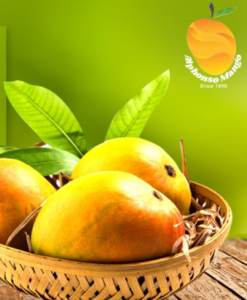The journey of an Alphonso mango, from flower to fruit maturity, is a fascinating process that spans several months and involves distinct stages of growth and development:
Flowering: The Alphonso mango tree typically flowers between December and February, depending on the region and climate. The flowers are small and white, often tinged with pink or purple. Mango trees are largely self-pollinating, but cross-pollination by insects such as bees can also occur.
Fruit Set: After successful pollination, the flowers start to develop into small fruits. Not all flowers may develop into fruits; some may naturally drop off due to various factors such as inadequate pollination or unfavorable weather conditions.
Fruit Development: Over the next few months, the mango fruits begin to grow in size. Initially, they are small and green, and as they mature, they gradually enlarge and their color changes from green to yellow-green.
Maturation: The maturation period for Alphonso mangoes can vary but typically ranges from late March to May or June, depending on the climate and location. During this time, the mangoes undergo significant changes in texture, flavor, and aroma.
Ripening: As the mangoes mature on the tree, they start to ripen. The color of the fruit turns from green to a characteristic golden yellow with hints of red blush. The skin becomes smoother and softer, and the aroma intensifies, emitting a sweet and fruity fragrance.
Harvesting: Mangoes are usually harvested by hand-picking when they are fully mature but still firm. For Alphonso mangoes, this is a critical step to ensure they are harvested at peak flavor and quality.
Post-harvest: After harvesting, Alphonso mangoes continue to ripen off the tree. They are often treated with ethylene gas to hasten ripening and improve uniformity. Proper handling and storage are crucial to preserve their delicate flavor and texture.
Consumption: Once ripe, Alphonso mangoes are enjoyed fresh, often peeled and eaten plain or used in a variety of culinary dishes, desserts, beverages, and preserves. They are celebrated for their rich, sweet flavor and smooth, non-fibrous texture.
Throughout this journey, the Alphonso mango undergoes a transformation from a delicate flower to a prized fruit, cherished for its unique taste and fragrance. Each step in its growth and maturation contributes to its exceptional quality and appeal.





